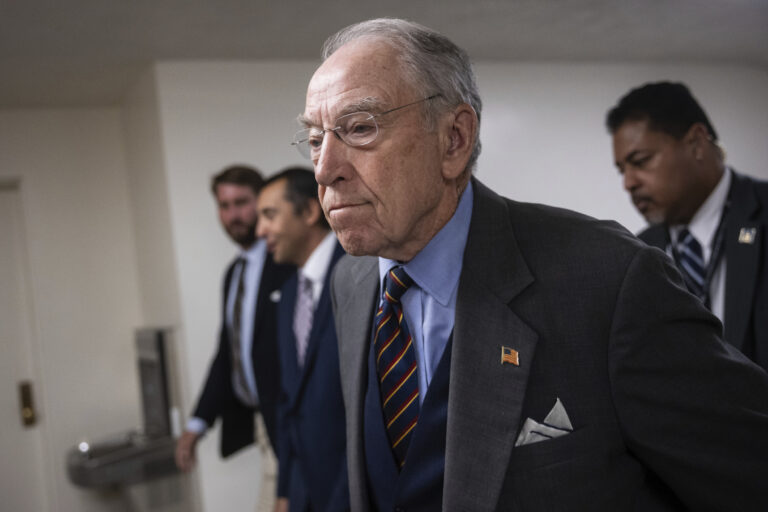Donald Trump has urged Senate Judiciary Committee Chair Chuck Grassley to abandon the “blue slip” tradition that allows senators to object to presidential judicial appointments.
In a Truth Social post on Tuesday, Trump complained that the process allowed blue state senators to block his conservative judge nominees.
“Senator Grassley must step up, like Crooked Joe Biden did, when he openly broke, at least two times, the “Blue Slip” SCAM, and like others have done over the years, and let our Great Republican Judges and U.S. Attorneys BE CONFIRMED,” Trump wrote.
Why It Matters
Trump appointed 234 federal judges during his first term including three Supreme Court justices and 54 appellate court judges, thanks in part to Grassley relaxing or ignoring the blue slip tradition. Senate Majority Leader Mitch McConnell also prioritized judicial nominations, often reducing debate time and holding votes in rapid succession.
In comparison, Trump’s second term judicial appointments have been much slower with only three judges confirmed in the first six months. The president has also railed against many district court judges in recent months after they blocked several of his policies on legal grounds.
What Is the Blue Slip?
The blue slip process is a Senate tradition that gives home-state senators a say in the confirmation of federal judges and U.S. attorneys nominated to serve in their state. When a nomination is made, the Senate Judiciary Committee sends a blue-colored form—called a “blue slip”—to the nominee’s home-state senators, who can approve or oppose the nominee by returning or withholding the form. While not legally binding, this practice has often allowed a single senator to effectively block a nomination.
The process is rooted in senatorial courtesy and is meant to ensure local input in federal appointments. However, it has become a source of controversy, especially when used for partisan obstruction. How strictly it’s enforced depends on the chair of the Judiciary Committee. Critics argue the blue slip process is outdated and undemocratic, enabling political gridlock. Supporters maintain it’s an important check that respects states’ representation in the federal appointment process.
What To Know
In his Truth Social post, Trump said that Democrats “have an ironclad stoppage of Great Republican Candidates.” He did not mention that Republicans have the same veto power for Democrat nominees.

Francis Chung/AP
“Put simply, the President of the United States will never be permitted to appoint the person of his choice because of an ancient, and probably Unconstitutional, ‘CUSTOM,’ that if you have, even one person in the opposite Party serving in the U.S. Senate, he/she must give consent, thereby completely stopping the opposite Party’s Nomination,” he continued, adding the rule prevented him from appointing his judges of choice in blue strongholds such as California, New York and New Jersey.
Trump urged Grassley to “have courage” and “step up” to ignore the blue slip process and appoint his nominees above the objections of home-state senators.
Grassley had announced during Trump’s first term that he would no longer treat blue slips from home-state senators as absolute vetoes, and proceeded with hearings for nominees including David Stras, for the 8th Circuit, and Kyle Duncan, for the 5th, despite Al Franken and other home-state senators withholding approval.
The Republican defended his approach by arguing that for much of the 20th century, blue slips were advisory, not veto-based. “The blue slip is meant to encourage pre-nomination consultation, not vest a senator with the power to block a nominee for political or ideological reasons,” he wrote in a 2018 op-ed.
Joe Biden’s Senate Judiciary Chair Dick Durbin then followed this precedent and advanced Andre Mathis to the Sixth Circuit in 2022, despite neither Tennessee senator returning the blue slip.
In April this year, Grassley appeared to have a change of heart. When asked if he would honor the blue slip position of senators during Trump’s second term he said, “The answer is yes… If they are from the state the nomination comes from.”
That would mean a more challenging confirmation process for many of Trump’s judicial appointees.
Currently Emil Bove is awaiting confirmation after being nominated to the Third Circuit Court of Appeals.
Bove’s nomination is a deeply controversial one and when the Senate Judiciary Committee advanced him earlier this month, over home-state senators Cory Booker and Andy Kim’s objections, Democratic senators walked out of the hearing in protest.
Trump’s former personal defense attorney has been accused by a whistleblower of telling Justice Department subordinates they may need to defy a court order blocking Trump’s mass deportation. He denies the allegations.
What People Are Saying
President Trump said in a Tuesday evening Truth Social, “[Grassley] should do this, IMMEDIATELY, and not let the Democrats laugh at him and the Republican Party for being weak and ineffective. The Democrats have broken this ridiculous custom on us, it’s time that we break it on them. Chuck, I know you have the Courage to do this, DO IT!”
Sen. Grassley said in a 2018 op-ed, “Whether a nominee is suitable for the federal appellate bench is a decision for the entire Senate… My decision upholds the long tradition that blue slips are not ideological weapons for obstructing qualified nominees from receiving hearings.”
What Happens Next
The Senate is expected to take a final vote on Bove this week, although Democrats are demanding a DOJ probe as a third whistleblower comes forward.


